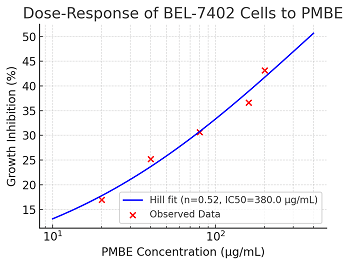Vol 7 (2025)
Research Article
Objective: This study aims to develop a mechanistically grounded mathematical framework to quantify the time- and dose-dependent inhibitory effects of Pinus massoniana bark extract (PMBE) on BEL-7402 human hepatoma cells, advancing beyond phenomenological approaches through integration of stochastic processes and pharmacodynamic modeling.
Methods: A continuous-time branching–Hill hybrid model was constructed by integrating stochastic branching-process kinetics, logistic growth constraints, and sigmoidal pharmacodynamic inhibition (Hill function). The model was calibrated using 48-hour MTT assay data across five PMBE concentrations (20–200 µg/mL) and validated against experimental inhibition rates. Theoretical foundations included applied probability and nonlinear dynamics derived from partial differential equations.
Results: The model demonstrated high predictive accuracy, with a maximal inhibition rate of 0.24 at 160 µg/mL PMBE, closely matching empirical observations (0.237 ± 0.015). Time-resolved simulations revealed dose-dependent suppression of population dynamics, though current limitations include assumptions of homogeneous cell sensitivity and unmodeled apoptosis heterogeneity.
Conclusion: This hybrid framework bridges stochastic cell behavior with pharmacological inhibition kinetics, providing a quantitative basis for adaptive therapy optimization in hepatocellular carcinoma. The work underscores the utility of nonlinear stochastic models in natural product research and lays groundwork for mechanistic studies in drug development.
C-Reactive Protein in Solid Tumors: Clinically Meaningful Change
Background: C-Reactive Protein (CRP) is associated with cancer development, survival, and tumor recurrence. A barrier to its use is the inability to interpret changes in CRP levels.
Aims: The aim of this study was to determine when a change in CRP is clinically meaningful. Methods: This was a retrospective cohort study of consecutive cancer patients. Those with a solid tumor diagnosis and at least two consecutive CRP measurements postdiagnosis were included. Subjects were divided into Baseline High CRP (bHCRP; CRP ≥ 10 mg/L) and Baseline Normal CRP groups (bNCRP; CRP < 10 mg/L), We identified appropriate CRP cut-off points for CRP levels changes; compared bHCRP and bNCRP; constructed Kaplan- Meier survival plots and Cox Proportional Hazard Model to confirm cut-off points in each group.
Results: 1473 were eligible. In bHCRP group, Overall survival (OS) Mean (Standard Error) was 87(2) and 81(4) months for ≥ 50% vs < 50% CRP decrease respectively. In bNCRP group, OS was 90(3) and 105(3) months for ≥ 2x vs < 2x increase in CRP levels, respectively. These differences remained significant after adjusting for confounders.
Conclusion: After a baseline normal CRP an increase of 2-fold or greater was associated with clinical and statistically significantly shorter OS. Conversely, after a baseline high CRP a 50% or greater decrease from baseline was associated with longer OS. Quantification of clinically meaningful CRP change could impact more effective CRP use as a biomarker, prognostic indicator and aid therapeutic decision making. This is especially important to reduce healthcare disparities in financially struggling healthcare systems.
Background: Tumor cells are characterized by a higher production of ribosomes, which are necessary for maintaining enhanced cell growth and subsequent cell division.
Aim: The study aimed to develop a prognostic RPL score for hepatocellular carcinoma (HCC) and explore its association with immune evasion mechanisms mediated by tumor microenvironment alterations.
Methods: Using single-sample gene set enrichment analysis (ssGSEA), an RPLscore was constructed to estimate the dysregulation of ribosomal protein large (RPL) genes. The expression of RPL genes and their association with clinical outcomes and the tumor microenvironment (TME) were systematically investigated using bulk-seq and single-cell RNA-seq (scRNA-seq).
Results: High expression levels of RPL in HCC were associated with poorer overall survival (OS) (P < 0.001). The RPL score evaluated the RPL gene and verified its independent prognostic value for both OS and relapse-free survival (P = 0.0074 and P < 0.001, respectively). TME analysis indicated that RPL gene dysregulation was closely associated with T cell exhaustion, myeloid-derived suppressor cell (MDSC) infiltration, and vascular dysplasia may be promoted by arginine deficiency (P = 7.6 × 10-10). The scRNA-seq data suggested that the RPL score was positively and significantly associated with the tumor biodiversity score (ITH score).
Conclusion: The study highlights the prognostic value of the RPL score and its potential role in mediating immune evasion of HCC, which may provide an impetus for the development of new targets for the treatment of HCC.
Case Report
The Role of Radiotherapy in Familial, Multiple and Symptomatic Cerebral Cavernomas
Stereotactic radiosurgery is an effective and safe method that can help prevent the development of deep-seated or large-sized cavernomas. However, there are limited studies on familial, multiple and symptomatic cerebral cavernous malformations (CCM). The approach in these cases is not yet clear. This case is a CCM that can be confused with other brain masses and metastases, and contributes to the literature in terms of genetic transmission, management and treatment of cavernomas.
Book Review

Pages 286-289
Rethinking Cancer: A New Paradigm for the Postgenomics Era is a groundbreaking book edited by leading scientists Bernhard Strauss, Marta Bertolaso, Ingemar Ernberg, and Mina J. Bissell, and published by MIT Press in April 27, 2021.



 Ying-Yu Cui, Xi-Han Fang, Xiao-Qing Fu
Ying-Yu Cui, Xi-Han Fang, Xiao-Qing Fu



